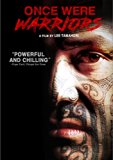| Reviews & Columns |
|
Reviews DVD TV on DVD Blu-ray 4K UHD International DVDs In Theaters Reviews by Studio Video Games Features Collector Series DVDs Easter Egg Database Interviews DVD Talk Radio Feature Articles Columns Anime Talk DVD Savant Horror DVDs The M.O.D. Squad Art House HD Talk Silent DVD
|
DVD Talk Forum |
|
|
| Resources |
|
DVD Price Search Customer Service #'s RCE Info Links |
|
Columns
|
|
|
Once Were Warriors
Film Movement // Unrated // September 6, 2016
List Price: $39.95 [Buy now and save at Amazon]
The Film:
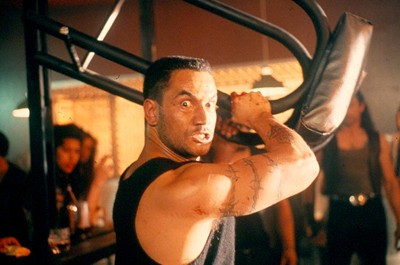 Glimpsing into the workings of another culture through cinematic storytelling can be rewarding on its own, but those kinds of films hold even more power when they tie together and reflect upon widespread, relatable social concerns. Lee Tamahori's Once Were Warriors offers such a look at New Zealand's indigenous Maori tribe and their perseverance in the modern era, highlighting how different descendants interpret -- or eschew -- their heritage. This cultural perception works as a filter, though, the added context behind a moving and harrowing glimpse at raising children amid alcohol dependence, poverty, and violent control over women. The events that transpire in Once Were Warriors aren't easy to stomach, yet the fraught, magnetic performances and the ways in which Tamahori binds those social issues to the tribal lineage makes for an effortlessly compelling and unforgettable portrait, one that justifies its zealous drama with poetic messages about one's roots.
Glimpsing into the workings of another culture through cinematic storytelling can be rewarding on its own, but those kinds of films hold even more power when they tie together and reflect upon widespread, relatable social concerns. Lee Tamahori's Once Were Warriors offers such a look at New Zealand's indigenous Maori tribe and their perseverance in the modern era, highlighting how different descendants interpret -- or eschew -- their heritage. This cultural perception works as a filter, though, the added context behind a moving and harrowing glimpse at raising children amid alcohol dependence, poverty, and violent control over women. The events that transpire in Once Were Warriors aren't easy to stomach, yet the fraught, magnetic performances and the ways in which Tamahori binds those social issues to the tribal lineage makes for an effortlessly compelling and unforgettable portrait, one that justifies its zealous drama with poetic messages about one's roots.
After leaving their small Maori town and marrying young amid much disapproval, Beth Heke (Rena Owen) and her husband, the brutish Jake the Muss (Temuera Morrison), live in a ramshackle house with their five children close to a New Zealand city. Jake struggles to hold down jobs, leaving him on government welfare ... and, gauging by his daily drinking and partying, seems perfectly content to continue doing so. Beth cleans for some extra money, but mostly she sticks around the house and cares for her husband and children, while also sporadically joining in with the boozy, singing lifestyle Jake brings home. Their children run the gamut: the two boys are rapidly approaching the realm of being full-on criminals, one, Nig (Julian Arahanga) who's close to joining a gang and another, Boogie (Taungaroa Emile), who has an approaching court date for minor felonies; the daughter, Grace (Mamaengaroa Kerr-Bell), on the other hand, has a gentle, poetic soul who helps clean up the house and care for the other two, much younger siblings. Disdain runs through them all for Jake the Muss, whose volatile attitude goes on the upswing shortly after losing his most recent job.
Lurking in the corners of the city and within Jake's regular bar, Once Were Warriors locates the descendants of the Maori people scattered around the poor sections of the unidentified New Zealand town, depicting the clash of tribal and urban ways of life as a tattered, tattooed, rough-and-tumble existence burdened by criminal activity. Alan Duff, the author of the eponymous book that the film's based upon, drew from his own experiences while conceiving the story, and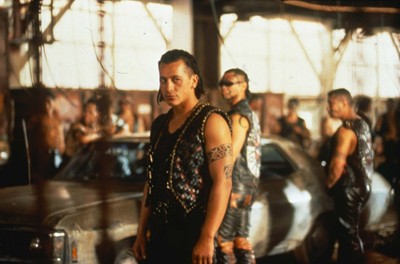 that honesty and rawness comes through in the film's depiction of the social, economic, and philosophical challenges encountered by the indigenous people. By way of unflinching, sepia-leaning photography and a mix of jazzy local tunes and a soulful guitar-oriented rhythm from composers Murray Grindlay and Murray McNabb, Once Were Warriors pours those issues into the cramped Heke household, where sing-a-longs and laughter convey effortless camaraderie as the beer bottles pile up and the children listen in on the fleeting merriment from upstairs, awaiting the inevitable change in mood and the mess they leave afterwards.
that honesty and rawness comes through in the film's depiction of the social, economic, and philosophical challenges encountered by the indigenous people. By way of unflinching, sepia-leaning photography and a mix of jazzy local tunes and a soulful guitar-oriented rhythm from composers Murray Grindlay and Murray McNabb, Once Were Warriors pours those issues into the cramped Heke household, where sing-a-longs and laughter convey effortless camaraderie as the beer bottles pile up and the children listen in on the fleeting merriment from upstairs, awaiting the inevitable change in mood and the mess they leave afterwards.
The years have taken a toll on the relationship between Beth and Jake, yet there's still passion and love there, making Beth's tolerance of her husband's behavior all the more heartbreaking. Sporting a few tattoos -- less than those of the local Maori gang members, mind you -- and a thick, intimidating frame, Jake the Muss is a force of nature who does little to control his dominant tendencies, largely because of the praise he receives from his buddies while doing so. It's the kind of respect one can imagine a burly warrior receiving at essentially any other time and place throughout history, though his love of guzzling beer and conquering foes clashes with the domestic life he should be tending to at home, something he cannot seem to grasp. Instead, he routinely upends his house with loud parties and even louder arguments with Beth whenever she's not accommodating to his needs, or, quite simply, when he's had too much to drink, fueled by Temuera Morrison's bestial body language and wide, piercing eyes.
The viewpoint changes throughout to show how Jake's lifestyle reverberates across the entire Heke family, from the eldest son Nig's involvement with an imposing gang as a sort of surrogate family to the evolution of their gentle daughter, Grace, while surrounded by misogynistic, boozy instability. Amid all this, however, it's tough not to look at Beth as the heroine of Once Were Warriors, the one directly trapped underneath Jake's might whose actions and responses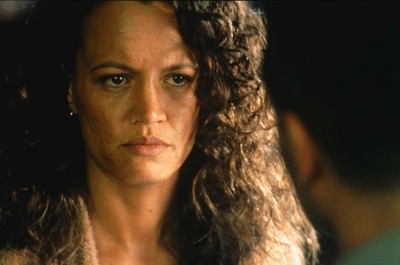 could dictate the future of her children. An absorbing portrait forms around how she navigates between the restrictions of being so poor, the threat of physical abuse from her brute of a husband, and the devotion she has toward holding her family together, commanded by a performance from Rena Owen that beautifully and naturally transforms Beth's trauma into a rediscovery of what those of her bloodline are capable of doing. Her wistful reflections on the past inform her tolerance and frustration with the present, which create a layered outlook on the highs and lows of Beth's maternal capabilities.
could dictate the future of her children. An absorbing portrait forms around how she navigates between the restrictions of being so poor, the threat of physical abuse from her brute of a husband, and the devotion she has toward holding her family together, commanded by a performance from Rena Owen that beautifully and naturally transforms Beth's trauma into a rediscovery of what those of her bloodline are capable of doing. Her wistful reflections on the past inform her tolerance and frustration with the present, which create a layered outlook on the highs and lows of Beth's maternal capabilities.
Every member of the Heke family embarks on their own journey in Once Were Warriors, forming into equal measures of heartrending tragedy and bittersweet triumph suffocating under the might of their patriarch. Director Tamahori creates an unrestrained perspective on the examples set and the ill-fated atmosphere created by Jake the Muss, then balances it out with the subtle ways in which these descendants of proud Maori people find ways of recapturing the spirit of their origin, enriched by the modern-day application of tribal tattoos, fighting with staves, and primal ceremonial chants. None of this happens easily, though, with the story leading the characters' difficult paths toward a poignant yet devastating conclusion that, in the midst of its saddening layers, also musters the strength of its characters and their ancestry. While specific to New Zealand's indigenous heritage, Once Were Warriors ultimately endures as a daring and universal portrayal of breaking whatever abusive, seemingly hopeless stranglehold life sometimes inflicts upon people.
The Blu-ray:
Once Were Warriors arrives from Film Movement in a rather classy clear-case presentation, featuring front and interior artwork showcasing characters from the film in a harsh orange-and-red aesthetic befitting the film contained within. The exterior design reappears on the disk and the front of the rather thick Booklet, with contains an essay from New Zealand film critic Peter Calder.
Video and Audio:
All points considered, Film Movement telegraphs an impressive punch with their high-definition transfer of Once Were Warriors. At first, one might be concerned by the window-boxing of the title cards, creating a black barrier around them and the handful of scenes at the very beginning. Eventually, the footage opens up to the film's 1.78:1-framed aspect ratio for the remainder of the 1080p AVC treatment, which takes the film's earthy tan-centered palette and focuses on keeping the cinematography looking as natural as possible. Spray-painted cars, twisted metal, and hazy alleys coax gritty fine details out of the setting, while the weave of an afghan, the strands of hair and the curvature of the tribal tattoos reveal finer, softer details to great effect. Skin tones range from heavy brown to deep cream, with the contrast adding a nice range of depth to those close-ups, while blues, reds, and greens of outdoor scenes and in bars are appropriately muted and brown-tinged alongside the film's color palette. There are some edge halos in high-contrast outdoor sequences, likely inherent to the print, along with some heavier grain and print speckles here and there, and darker sequences (mostly in the bar) showcase the disc's compression limitations that largely fade away in motion. Considering the film's low budget, color intentions, and age, however, Once Were Warriors looks reasonably choice.
The 5.1 DTS-HD Master Audio track struggles a little more with the quality and age of its source, which can be a bit tricky when it comes to the audibility of the New Zealand-accented dialogue. Despite the majority of the film's dialogue being in English -- some is in the Maori native language -- the lack of higher-end clarity and overly bulky midrange bass made it so I had to flip on the subtitles to follow along with everything that's being said, though a good portion of the dialogue does ring quite true and natural. A few moments exhibit a bit too much bass response, too, such as a very loud rumbling car in an underpass. Beyond that, however, there's a lot to appreciate in this high-definition track. Singing of songs, either in the bar or at Jake's home, retail a strong level of clarity and range. The breaking of bottles and thumps of fistfights telegraph moderately natural highs and throaty low-end response. Surround activity isn't a factor, exhibiting little to no response in the rear channels, but the film's activity doesn't really require that kind of depth; certain scenes might benefit from the expanded atmosphere, but nothing suffers from its absence. The English subtitles skip out on a few superfluous words here and there, but they're very well translated and legible.
Special Features:
Aside from the included essay, Film Movement have also ported over an old Behind the Scenes Featurette (11:42, 4x3), a legacy DVD feature through and through. Interviews with the cast and crew from the time are sprinkled within behind-the-scenes footage and liberal clips from the film, offering insights into the actors' involvement, their connection with the book, and some of the filmmaking intents. There's also a Theatrical Trailer (2:08, 4x3), one of the better ones that conveys the film's general intents without giving much of the story away.
Final Thoughts:
Powerful and provocative, Once Were Warriors latches onto a meaningful message while telling the story of the Heke family, about those embroiled in social stigmas, urban environments, and abusive and dangerous situations. Despite concentrating on how these descendants of noble Maori warriors struggle to hold onto their heritage under the weight of their patriarch, the menacing Jake the Muss, it offers a universal dose of commentary underneath the fierce, momentous drama, hinged on how Beth Heke manages the constraints of raising her impressionable children and subduing the ferocity of her husband. Booze, violence, and gender issues caught amid the two result in shocking drama, but the shocks are never without purpose or depth, nor without a grasp on the strength that comes from surviving such things. It's one of New Zealand's very best films, and it's a delight to have it on Blu-ray in the US from Film Movement, sporting respectable audiovisual properties and a ten-minute legacy featurette. Highly Recommended.
Thomas Spurlin, Staff Reviewer -- DVDTalk Reviews | Personal Blog/Site
 Glimpsing into the workings of another culture through cinematic storytelling can be rewarding on its own, but those kinds of films hold even more power when they tie together and reflect upon widespread, relatable social concerns. Lee Tamahori's Once Were Warriors offers such a look at New Zealand's indigenous Maori tribe and their perseverance in the modern era, highlighting how different descendants interpret -- or eschew -- their heritage. This cultural perception works as a filter, though, the added context behind a moving and harrowing glimpse at raising children amid alcohol dependence, poverty, and violent control over women. The events that transpire in Once Were Warriors aren't easy to stomach, yet the fraught, magnetic performances and the ways in which Tamahori binds those social issues to the tribal lineage makes for an effortlessly compelling and unforgettable portrait, one that justifies its zealous drama with poetic messages about one's roots.
Glimpsing into the workings of another culture through cinematic storytelling can be rewarding on its own, but those kinds of films hold even more power when they tie together and reflect upon widespread, relatable social concerns. Lee Tamahori's Once Were Warriors offers such a look at New Zealand's indigenous Maori tribe and their perseverance in the modern era, highlighting how different descendants interpret -- or eschew -- their heritage. This cultural perception works as a filter, though, the added context behind a moving and harrowing glimpse at raising children amid alcohol dependence, poverty, and violent control over women. The events that transpire in Once Were Warriors aren't easy to stomach, yet the fraught, magnetic performances and the ways in which Tamahori binds those social issues to the tribal lineage makes for an effortlessly compelling and unforgettable portrait, one that justifies its zealous drama with poetic messages about one's roots. After leaving their small Maori town and marrying young amid much disapproval, Beth Heke (Rena Owen) and her husband, the brutish Jake the Muss (Temuera Morrison), live in a ramshackle house with their five children close to a New Zealand city. Jake struggles to hold down jobs, leaving him on government welfare ... and, gauging by his daily drinking and partying, seems perfectly content to continue doing so. Beth cleans for some extra money, but mostly she sticks around the house and cares for her husband and children, while also sporadically joining in with the boozy, singing lifestyle Jake brings home. Their children run the gamut: the two boys are rapidly approaching the realm of being full-on criminals, one, Nig (Julian Arahanga) who's close to joining a gang and another, Boogie (Taungaroa Emile), who has an approaching court date for minor felonies; the daughter, Grace (Mamaengaroa Kerr-Bell), on the other hand, has a gentle, poetic soul who helps clean up the house and care for the other two, much younger siblings. Disdain runs through them all for Jake the Muss, whose volatile attitude goes on the upswing shortly after losing his most recent job.
Lurking in the corners of the city and within Jake's regular bar, Once Were Warriors locates the descendants of the Maori people scattered around the poor sections of the unidentified New Zealand town, depicting the clash of tribal and urban ways of life as a tattered, tattooed, rough-and-tumble existence burdened by criminal activity. Alan Duff, the author of the eponymous book that the film's based upon, drew from his own experiences while conceiving the story, and
 that honesty and rawness comes through in the film's depiction of the social, economic, and philosophical challenges encountered by the indigenous people. By way of unflinching, sepia-leaning photography and a mix of jazzy local tunes and a soulful guitar-oriented rhythm from composers Murray Grindlay and Murray McNabb, Once Were Warriors pours those issues into the cramped Heke household, where sing-a-longs and laughter convey effortless camaraderie as the beer bottles pile up and the children listen in on the fleeting merriment from upstairs, awaiting the inevitable change in mood and the mess they leave afterwards.
that honesty and rawness comes through in the film's depiction of the social, economic, and philosophical challenges encountered by the indigenous people. By way of unflinching, sepia-leaning photography and a mix of jazzy local tunes and a soulful guitar-oriented rhythm from composers Murray Grindlay and Murray McNabb, Once Were Warriors pours those issues into the cramped Heke household, where sing-a-longs and laughter convey effortless camaraderie as the beer bottles pile up and the children listen in on the fleeting merriment from upstairs, awaiting the inevitable change in mood and the mess they leave afterwards. The years have taken a toll on the relationship between Beth and Jake, yet there's still passion and love there, making Beth's tolerance of her husband's behavior all the more heartbreaking. Sporting a few tattoos -- less than those of the local Maori gang members, mind you -- and a thick, intimidating frame, Jake the Muss is a force of nature who does little to control his dominant tendencies, largely because of the praise he receives from his buddies while doing so. It's the kind of respect one can imagine a burly warrior receiving at essentially any other time and place throughout history, though his love of guzzling beer and conquering foes clashes with the domestic life he should be tending to at home, something he cannot seem to grasp. Instead, he routinely upends his house with loud parties and even louder arguments with Beth whenever she's not accommodating to his needs, or, quite simply, when he's had too much to drink, fueled by Temuera Morrison's bestial body language and wide, piercing eyes.
The viewpoint changes throughout to show how Jake's lifestyle reverberates across the entire Heke family, from the eldest son Nig's involvement with an imposing gang as a sort of surrogate family to the evolution of their gentle daughter, Grace, while surrounded by misogynistic, boozy instability. Amid all this, however, it's tough not to look at Beth as the heroine of Once Were Warriors, the one directly trapped underneath Jake's might whose actions and responses
 could dictate the future of her children. An absorbing portrait forms around how she navigates between the restrictions of being so poor, the threat of physical abuse from her brute of a husband, and the devotion she has toward holding her family together, commanded by a performance from Rena Owen that beautifully and naturally transforms Beth's trauma into a rediscovery of what those of her bloodline are capable of doing. Her wistful reflections on the past inform her tolerance and frustration with the present, which create a layered outlook on the highs and lows of Beth's maternal capabilities.
could dictate the future of her children. An absorbing portrait forms around how she navigates between the restrictions of being so poor, the threat of physical abuse from her brute of a husband, and the devotion she has toward holding her family together, commanded by a performance from Rena Owen that beautifully and naturally transforms Beth's trauma into a rediscovery of what those of her bloodline are capable of doing. Her wistful reflections on the past inform her tolerance and frustration with the present, which create a layered outlook on the highs and lows of Beth's maternal capabilities. Every member of the Heke family embarks on their own journey in Once Were Warriors, forming into equal measures of heartrending tragedy and bittersweet triumph suffocating under the might of their patriarch. Director Tamahori creates an unrestrained perspective on the examples set and the ill-fated atmosphere created by Jake the Muss, then balances it out with the subtle ways in which these descendants of proud Maori people find ways of recapturing the spirit of their origin, enriched by the modern-day application of tribal tattoos, fighting with staves, and primal ceremonial chants. None of this happens easily, though, with the story leading the characters' difficult paths toward a poignant yet devastating conclusion that, in the midst of its saddening layers, also musters the strength of its characters and their ancestry. While specific to New Zealand's indigenous heritage, Once Were Warriors ultimately endures as a daring and universal portrayal of breaking whatever abusive, seemingly hopeless stranglehold life sometimes inflicts upon people.
The Blu-ray:
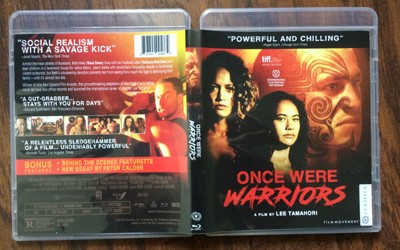 | 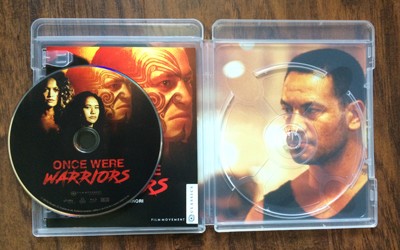 |
Once Were Warriors arrives from Film Movement in a rather classy clear-case presentation, featuring front and interior artwork showcasing characters from the film in a harsh orange-and-red aesthetic befitting the film contained within. The exterior design reappears on the disk and the front of the rather thick Booklet, with contains an essay from New Zealand film critic Peter Calder.
Video and Audio:
All points considered, Film Movement telegraphs an impressive punch with their high-definition transfer of Once Were Warriors. At first, one might be concerned by the window-boxing of the title cards, creating a black barrier around them and the handful of scenes at the very beginning. Eventually, the footage opens up to the film's 1.78:1-framed aspect ratio for the remainder of the 1080p AVC treatment, which takes the film's earthy tan-centered palette and focuses on keeping the cinematography looking as natural as possible. Spray-painted cars, twisted metal, and hazy alleys coax gritty fine details out of the setting, while the weave of an afghan, the strands of hair and the curvature of the tribal tattoos reveal finer, softer details to great effect. Skin tones range from heavy brown to deep cream, with the contrast adding a nice range of depth to those close-ups, while blues, reds, and greens of outdoor scenes and in bars are appropriately muted and brown-tinged alongside the film's color palette. There are some edge halos in high-contrast outdoor sequences, likely inherent to the print, along with some heavier grain and print speckles here and there, and darker sequences (mostly in the bar) showcase the disc's compression limitations that largely fade away in motion. Considering the film's low budget, color intentions, and age, however, Once Were Warriors looks reasonably choice.
The 5.1 DTS-HD Master Audio track struggles a little more with the quality and age of its source, which can be a bit tricky when it comes to the audibility of the New Zealand-accented dialogue. Despite the majority of the film's dialogue being in English -- some is in the Maori native language -- the lack of higher-end clarity and overly bulky midrange bass made it so I had to flip on the subtitles to follow along with everything that's being said, though a good portion of the dialogue does ring quite true and natural. A few moments exhibit a bit too much bass response, too, such as a very loud rumbling car in an underpass. Beyond that, however, there's a lot to appreciate in this high-definition track. Singing of songs, either in the bar or at Jake's home, retail a strong level of clarity and range. The breaking of bottles and thumps of fistfights telegraph moderately natural highs and throaty low-end response. Surround activity isn't a factor, exhibiting little to no response in the rear channels, but the film's activity doesn't really require that kind of depth; certain scenes might benefit from the expanded atmosphere, but nothing suffers from its absence. The English subtitles skip out on a few superfluous words here and there, but they're very well translated and legible.
Special Features:
Aside from the included essay, Film Movement have also ported over an old Behind the Scenes Featurette (11:42, 4x3), a legacy DVD feature through and through. Interviews with the cast and crew from the time are sprinkled within behind-the-scenes footage and liberal clips from the film, offering insights into the actors' involvement, their connection with the book, and some of the filmmaking intents. There's also a Theatrical Trailer (2:08, 4x3), one of the better ones that conveys the film's general intents without giving much of the story away.
Final Thoughts:
Powerful and provocative, Once Were Warriors latches onto a meaningful message while telling the story of the Heke family, about those embroiled in social stigmas, urban environments, and abusive and dangerous situations. Despite concentrating on how these descendants of noble Maori warriors struggle to hold onto their heritage under the weight of their patriarch, the menacing Jake the Muss, it offers a universal dose of commentary underneath the fierce, momentous drama, hinged on how Beth Heke manages the constraints of raising her impressionable children and subduing the ferocity of her husband. Booze, violence, and gender issues caught amid the two result in shocking drama, but the shocks are never without purpose or depth, nor without a grasp on the strength that comes from surviving such things. It's one of New Zealand's very best films, and it's a delight to have it on Blu-ray in the US from Film Movement, sporting respectable audiovisual properties and a ten-minute legacy featurette. Highly Recommended.
|
| Popular Reviews |
| Sponsored Links |
|
|
| Sponsored Links |
|
|
| Release List | Reviews | Shop | Newsletter | Forum | DVD Giveaways | Blu-Ray | Advertise |
|
Copyright 2024 DVDTalk.com All Rights Reserved. Legal Info, Privacy Policy, Terms of Use,
Manage Preferences,
Your Privacy Choices | |||||||









